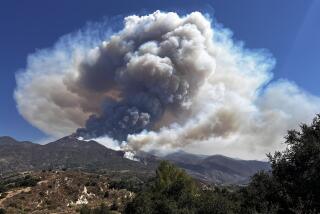Punishing the Park Serviceâs Good Deeds
WASHINGTON â As secretary of the Interior during the late 1990s, I brought the departmentâs employees together annually for an awards ceremony. The Valor Awards, conferred for heroism in the face of danger, were the eventâs highlight.
One year, Kinsey Shilling received a Valor Award for directing a nine-hour rescue operation to save a kayaker who had gone over a West Virginia waterfall and gotten trapped behind it. Charles Mitchem earned his award responding to a 911 emergency call outside New River Gorge in West Virginia. He helped drag a wounded city policeman to safety, then talked the gunman whoâd shot him into surrendering. Martin Towery was recognized for heroism while off duty. He was boating with his family near Ozark National Scenic Riverways in Missouri when he observed a man trapped in a rapid, dived in and pulled him to safety.
All of these National Park Service employees would probably say that their heroism was just part of a dayâs work, that they did what theyâd been trained to do, on duty and off, in the parks and in neighboring communities, as part of their job. Working for the Park Service is demanding. Its employees dedicate their lives to serving the public. They acquire skills in everything from search and rescue, firefighting and law enforcement to geology, botany and hydrology.
What our Park Service employees do best, though, is interpret our great national parks to the millions of visitors who come each year to see and learn about wading birds in the Everglades, ancient trees in Yosemite, the geologic mysteries of the Grand Canyon and a thousand other such wonders. How many million Americans, I wonder, cherish a childhood memory of listening to a park ranger at a campfire or on a hike?
Apparently such memories do not live on in the Bush administration, which has proposed putting the Park Service on the auction block. Under a new proposal, many Park Service employees would be put out to pasture, their jobs contracted out to the lowest bidders. Up to 70% of all full-time jobs in the National Park Service -- including workers with irreplaceable expertise in protecting natural and cultural resources, archaeologists, biologists, historians and museum curators -- could be privatized, starting next year. Low-wage temporary workers may be adequate for flipping burgers, but thereâs unlikely to be much natural history on the menu if the proposal is allowed to go through.
This effort, part of the presidentâs âcompetitive sourcingâ initiative under which federal agencies are required to allow private companies to bid on providing some work now done by government employees, has generated an unprecedented response within career ranks of the National Park Service. Last May, a large group of retired Park Service professionals, including many park superintendents, sent a letter to President Bush and Interior Secretary Gale A. Norton. âWe are dismayed,â they wrote, âto see that [the parks] are being turned over piece by piece, contract by contract, to well-connected special interests whose foremost concern is maximizing profit and personal gain.â
That letter caught the attention of Congress. After hearing testimony that the administration had ignored previous congressional directives requiring consultation before taking action on this matter, a House committee added language to the Interior Departmentâs appropriations bill, ordering the administration to halt the program. But so far, Bush has refused to back off. The lines are now clearly drawn, and the future of our magnificent national parks is at stake.
Putting the National Park Service out to bid makes about as much sense as privatizing the Marine Corps or the Foreign Service. There are some jobs where you donât just put in eight hours and go home. In the Marines, even the cooks are trained and prepared to pick up a rifle and go into battle. The national parks operate on a similar work ethic. As secretary of the Interior, I went to fire school, obtained my âred cardâ and went out to fight fires in the summer. On the fire lines, I worked alongside Park Service maintenance workers, file clerks, historians, scientists and rangers -- all ready to do the job when necessary.
When the public awakens to this proposal to eviscerate the Park Service (and other land management agencies including the Forest Service, the Fish and Wildlife Service and the Bureau of Land Management), this administration will probably tell us it is only talking about auctioning off jobs that are not âmission-criticalâ or not âinherently governmentalâ or some such mumbo jumbo.
Iâd like to hear them explain that to Steven Drager, one of the employees to whom I gave a Valor Award back in 1999. Drager was on duty at Yosemite National Park, supervising a construction project, when he saw a park visitor swept downstream in the Merced River. The river was swollen and icy cold with spring floods. Without hesitating, Drager plunged in to pull the victim to safety. Drager was not a ranger. He was an engineer. On that day, he was certainly âmission-critical.â
And now, his job could well be outsourced as early as next year if the administration has its way.
More to Read
Sign up for The Wild
Weâll help you find the best places to hike, bike and run, as well as the perfect silent spots for meditation and yoga.
You may occasionally receive promotional content from the Los Angeles Times.






